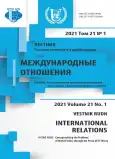U.S. Migration Policy Radicalization (2017-2019): Case of Mexico and Central America
- Authors: Eremin A.A.1
-
Affiliations:
- RUDN University
- Issue: Vol 21, No 1 (2021): Conceptualizing the Problems of World Politics through the Prism of IR Theory
- Pages: 108-118
- Section: PEACE AND SECURITY
- URL: https://journal-vniispk.ru/2313-0660/article/view/320333
- DOI: https://doi.org/10.22363/2313-0660-2021-21-1-108-118
- ID: 320333
Cite item
Full Text
Abstract
This article is an attempt to critically analyze the policy of the 45th President of the United States Donald Trump regarding the southern border of the USA with Mexico. The paper analyzes the approach of Washington under the administration of D. Trump to the problem of the joint border between USA and Mexico, as well as conducts a comprehensive assessment of the main programs underlying the most pressing changes in D. Trump’s policy in this area. In particular, the paper focuses on the structure of migration flows between 2017 and 2019, as well as on the reasons behind those changes. The author looks at the root causes of the unprecedented increase in the flow of potential migrants and refugees, and correlates them with the ongoing political, economic and humanitarian crises in the Central American sub-region. An important focus is given to the increasing role of Mexico in the settlement of this issue, as well as to the potential impact of such cooperation between the authorities of the United States and Mexico on the situation in Central America and Latin America in general. The significance of this paper is determined by the objective necessity of academic evaluation of the Donald Trump’s administration impact on the United States governmental and foreign policy course. The author argues that the approach of the 45th president of the United States regarding traditionally sensitive issues like US - Mexico border control and migration has been mostly based on coercive tactics with obvious disregard towards social basis and root-causes of the issue at hand. One of the most distinguished traits of this approach is the practice of “outsourcing” managing the problem of refugees from Central America to the border-country, which in this specific case is Mexico.
Keywords
About the authors
Arkadiy Alekseevich Eremin
RUDN University
Author for correspondence.
Email: eremin_aa@pfur.ru
PhD in History, Senior Lecturer, Department of Theory and History of International Relations
Moscow, Russian FederationReferences
- Armendares, P.E., & Moreno-Brid, J.C. (2019). La política migratoria de Trump: antecedentes y consecuencias para los migrantes mexicanos y sus comunidades. México y la Cuenca del Pacífico, 8(22), 1-31. (In Spanish). doi: 10.32870/mycp.v8i22.606
- Balakina, Yu.V., & Jucovscaia, A. (2019). Public Reaction to the US Restrictive Migration Policy in Twitter: The Analysis of Intertextuality. Bulletin of Perm University. Political Science, 13(1), 47-58. (In Russian)
- Barret, W. (2016). Trump: The Greatest Show on Earth: The Deals, the Downfall, and the Reinvention. New York: Regan Arts
- Collins, K. (2013). Life in the US - Mexican Border Region: Residents’ Perceptions of the Place. Journal of Borderlands Studies, 28(1), 127-146. doi: 10.1080/08865655.2013.796210
- De Zarate, A.O., & Shubic, Y.G. (2018). Humanitarian Crisis: Unaccompanied Migrant Minors from Central America to the US - Mexican Border. The Copernicus Journal of Political Studies, 1(7), 160-175
- Frolova, O.A. (2017). The Issue of Migration Control in Presidential Race of 2016: Historical Aspect and Modernity. Russian Political Science, 1(2), 56-62. (In Russian).
- Ganster, P., & Lorey, D.E. (2015). The US-Mexican Border Today: Conflict and Cooperation in Historical Perspective. Rowman & Littlefield Publishers.
- Genovese, M.A. (2017). How Trump Governs: An Assessment and a Prognosis. New York: Cambria Press.
- Heith, D.J. (2020). The End of the Rhetorical Presidency? Public Leadership in the Trump Era. New York: Routledge. doi: 10.4324/9781003057178
- Kaczmarek, A. (2018). The Right to Life Denied: The Culture of Violence along the US-Mexican Border. Studia Anglica Resoviensia, (15), 47-58. doi: 10.15584/sar.2018.15.1.4
- Krasnov, Y.K. (2017). Donald Trump’s Migration Policy Reform. Migratsionnoe Pravo, (3), 18- 21. (In Russian).
- Kudeyarova, N. (2017). Mexico: “The Population Explosion” and Mass Migration. Cuadernos Iberoamericanos, (2), 56-62. (In Russian). doi: 10.46272/2409-3416-2017-2-56-62
- Kudeyarova, N.Yu. (2019). The Southwest Border Problem Politicization: The U.S. and Mexico in Regional Migration System. USA & Canada: Economics, Politics, Culture, 49(11), 55-70. (In Russian). doi: 10.31857/S032120680007286-8
- Manukhin, A. (2019). The Features of Donald Trump Administration’s Policy in Latin America. Rossiya i Amerika v XXI Veke, (S1), 1-14. (In Russian). doi: 10.18254/S207054760005322-1
- Manukhin, A.A. (2018). Mexico and the United States: Are There New Treats for Old Sores? Latinskaia Amerika, (4), 52-66. (In Russian)
- Martin, P.L. (2019a). President Trump and Migration Policy. Journal of Economy Culture and Society, 60(1), 1-15. doi: 10.26650/JECS2019-0024
- Martin, P.L. (2019b). Trump, Migration, and Agriculture. Border Crossing, (9), 19-27. DOI: 10.33182/ bc.v9i1.674
- Martínez Flores, F. (2020). The Effects of Enhanced Enforcement at Mexico’s Southern Border: Evidence from Central American Deportees. Demography, (57), 1597-1623. doi: 10.1007/s13524-020-00914-3
- Rodrik, D. (2018). Is Populism Necessarily Bad Economics? AEA Papers and Proceedings, (108), 196-199. doi: 10.1257/pandp.20181122
- Travkina, N.M. (2018a). Donald Trump’s Immigration Policy: Intermediate Results. Perspectives, 2(14), 69-81. (In Russian).
- Travkina, N.M. (2018b). November 2018 United States Elections: Referendum on Donald Trump. Perspectives, 3(15), 45-60. (In Russian). doi: 10.32726/2411-3417-2018-3-45-59
- Travkina, N.M. (2018c). USA: Changing Algorithm of Development. Moscow: Ves’ mir publ. (In Russian).
- Valli, V. (2018). The American Economy from Roosevelt to Trump. Cham: Palgrave Macmillan. doi: 10.1007/978-3-319-96953-4
- Walsh, K.T. (2020). Presidential Leadership in Crisis: Defining Moments of the Modern Presidents from Franklin Roosevelt to Donald Trump. Routledge.
- Woodward, B. (2018). FEAR: Trump in White House. New York: Simon & Schuster.
Supplementary files









